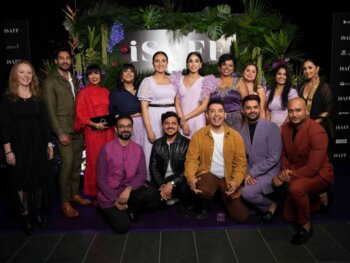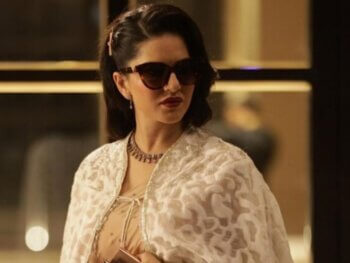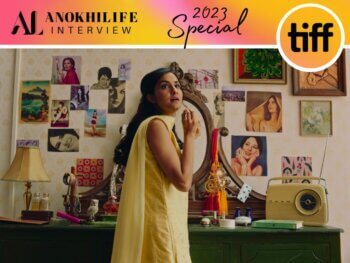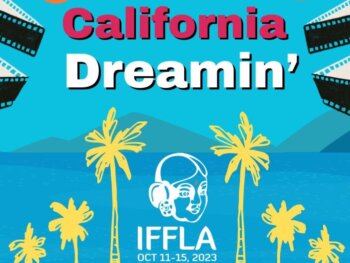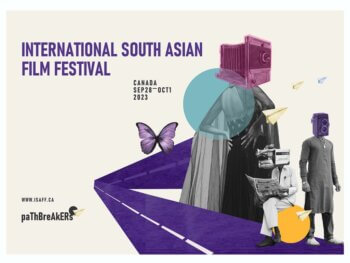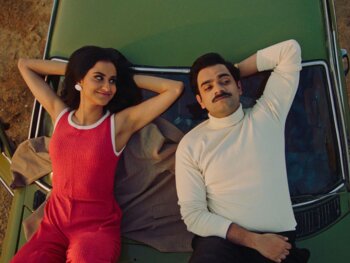For her third directorial effort, Zwigato, director Nandita Das casts Indian comic Kapil Sharma, in a more dramatic sort of role, as a man who loses his job during the pandemic and is forced to start working for a food-delivery app. As he endures the stresses and indignities of his new lot, his wife (Shahana Goswami) enters the workforce as well — redefining their relationship. During the Toronto International Film Festival, Das talked to Anokhi Life about shining a light on the gig economy and the people who are all too often exploited by it.
Back in 2008, actress-turned-filmmaker Nandita Das came to TIFF with her directorial debut, the roundly acclaimed political thriller Firaaq. In 2022, she returned with her third feature — very much a movie for our times. Zwigato, so titled after the movie’s fictional food-delivery app, casts Indian standup sensation Kapil Sharma in his first big “dramatic” turn. He plays Manas, a factory worker in Bhubaneswar who loses his job after COVID hits. So he becomes a Zwigato courier, racing across the city on his motorcycle, putting his life at risk to earn enough cash (and five-star ratings) to keep his family afloat. Meanwhile, his wife Pratima (Shahana Goswami) leaves the house and gets a job for the first time — an exhilarating experience for her, but a move that upends their very traditional marriage.
Here, writer-director Das discusses the appeal of telling a human story set in a dehumanizing industry, as well as showing audiences a whole new side of Mr. Sharma.
Matthew Currie: This is very much a film that taps into the zeitgeist, with the pandemic and the proliferation of food-delivery apps. What did you want to accomplish with it?
Nandita Das: The germ of this idea came during the pandemic, when people were all ordering food. And there was this contact-less delivery, o we didn’t see who was delivering it. It was a fairly dehumanizing process. And there were so many of them; on the streets you would see them. I just felt there was such a need in today’s world, especially because we all live in our little bubbles, to visibilize these people who are hidden in plain site, have been made invisible by the whole structure of the society.
[The concept] began as a short film, and then I gave it to a producer, and he was like, “I really like the story, why don’t you expand it to a feature?” And I was like, “No, I don’t think I’m so invested in it to make it into a full feature film. It’s a lot about algorithms, and too much mathematical fact about incentive and rating, which I don’t understand enough.” But then when I started diving into it and doing more research and finding those human stories behind the whole economy, it was more about the people and their families — the impact it has, the anxiety around unemployment.
When those things started coming up, the story became more interesting to me. I also wanted to layer it with other disparities like caste, class, religion, gender. Then it became far more nuanced and layered, and really told a story of modern-day India, new urban India.
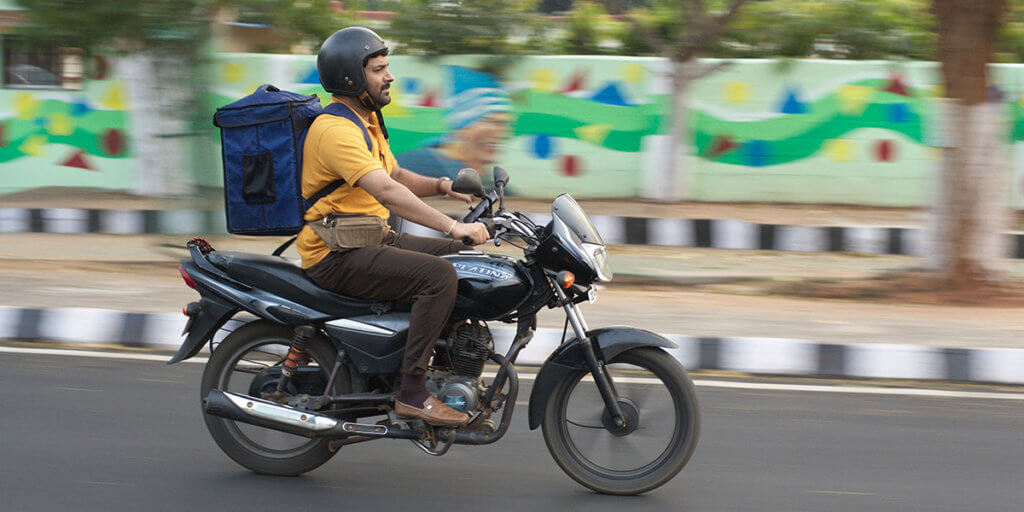
MC: As much as these sorts of apps and the services they provide are hailed as a life-changing tech breakthrough, there is a human cost . . .
ND: That’s what I’m bringing out, and it’s not really a blame game. Because we as consumers are just as complicit as these companies. Now we have these [offers where] “In 15 minutes, your groceries will be delivered.” But what’s the cost of that? The riders are crossing lines, they’re risking their lives to make it in time. There’s so much anxiety around it. So, the human cost is enormous, and as a filmmaker, as a storyteller, I’m just trying to bring that story out. I’m not trying to find a solution, because we don’t have a solution — and that’s not really the job of a filmmaker, either; you kind of just show a mirror to our lives.
And I always feel that if I can evoke any empathy for whoever that “other” is, whoever that “invisible person” is . . . I know [in this case] that my cast and crew started telling me that, “Now we notice them so much more.” I don’t hesitate to give five stars as a rating to them, because now I know what it means to them. It means so little to me, but I know how much it means to them, and I make the effort of going into the app . . . or just looking people in the eye, acknowledging their presence.
MC: Any time a comedian is cast in a “dramatic” role, it tends to cause a stir. How did Kapil end up in this film, and do you think the skills of a comedian translate naturally into the realm of a dramatic actor?
ND: I mean, I didn’t change a single line to accommodate his persona or the perception of his skills. I actually haven’t had a television for the last seven years. I hadn’t seen a single show of Kapil’s. I chanced upon something that he had done in an award function, and I just found him very disarmingly natural and candid and easy, and in some ways truly representing the ordinary man — even though he is no more an ordinary man. He had to [revert] to that life when he was more ordinary, maybe 14 years ago, when he was still in a small town and he still struggled and did many of the things that the character he played was experiencing. I just felt that there is a candidness, a trueness, a simplicity that Kapil brings to the character. And probably not knowing his body of work really helped, because I didn’t have that baggage to fight.
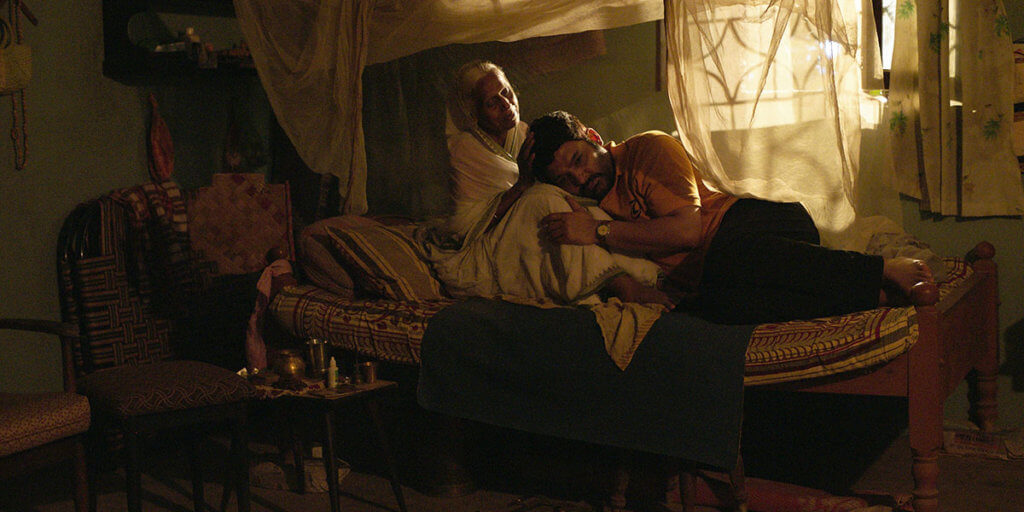
MC: Manas’s relationship with his wife is also quite a pivotal part of Zwigato . . .
ND: I feel when you make a film, you are not just talking about issues. Relationships reveal characters, and how they respond and how they think and how they interact with each other — that’s what creates a story. So for me it was very, very important that it wasn’t just about the rider, but about his family and especially his relationship with his wife and his children and his mother and that world that he lives in.
His wife is a very strong character. She’s someone who’s never worked outside, like many South Asian women; their work is always undervalued, because they’re just taking care of home and children and because it’s not monetized, it’s not seen with that same dignity and value. When we start the story, it’s also a time when she wants to work, where she feels like she needs to supplement the income, and in the process . . . for her, it’s a bittersweet experience, because she is enjoying this newfound independence and newfound identity that this work is bringing to her life, and at the same time she’s fearful of the unknown. Also, in this unorganized work sector that she explores, there are problems too.
MC: Her work also has a destabilizing effect on their marriage.
ND: It’s interesting to see we have these traditional patriarchal societies where men and women both are conditioned by it. So, while we want to create an empathy for the food-delivery driver, our main protagonist, we also want to show: What are his patriarchal views about a wife that he loves? It’s a great relationship, but when she wants to go out and work, he feels, “Your job is to take care of the home. You don’t really need to work.” That dynamic comes into play. It’s not a linear film with the story of the gig-economy worker, it’s the story also of our biases and prejudices about gender, caste and class. Class plays a big role in the film, the disparity — without underlining, without making it a messagey, heavy-handed story. But you do feel that there is a class disparity throughout the film that kind of stares at you, because that is a very important part of the reality.
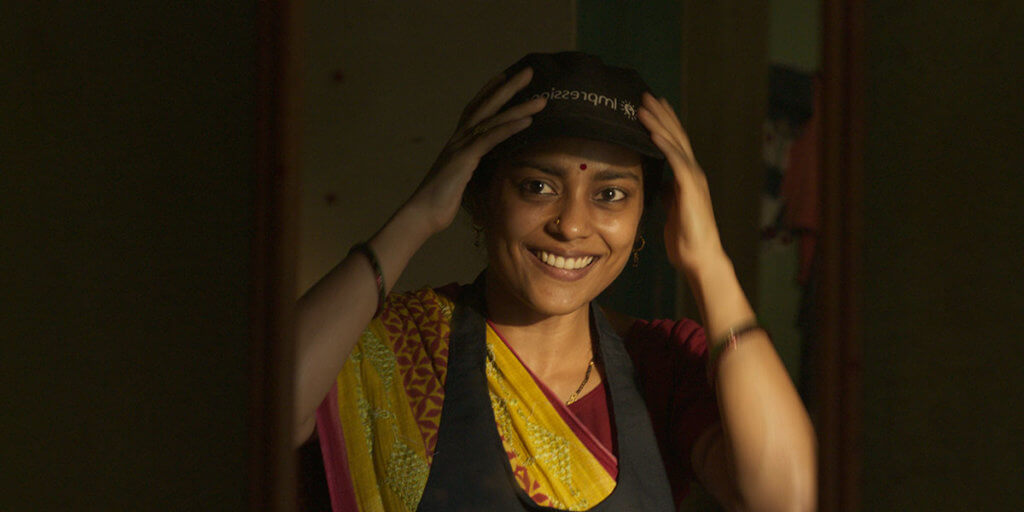
MC: Do you think your background as an actor informs your approach as a director?
ND: For sure. Those experiences were precious. I did films in 10 different languages that took me to many different parts of the country that I wouldn’t have gone as a traveller. And not just my acting work, but also my social advocacy work, which takes me to many different parts of the world, and I get to interact with a whole lot of different people. Subconsciously you carry those stories with you, and when you start writing or you start directing a film, they have a way of finding a way into your script. Sometimes you aren’t even aware of it. Sometimes [only] in retrospect you realize the connections.
MC: Something I always find interesting, which I think very much applies to this film, is the interplay between the specific and the universal in storytelling, and how that impacts an audience’s experience.
ND: Absolutely. I think that’s the power of a good story — where you’re really true and authentic to your own context. You have to situate a story in a context; it can’t be just universal for the sake of it. Not all references are understood by everyone. If I’m watching a Japanese or Spanish or Iranian film, I may not understand all of its references, but because the human emotions that film deals with are universal, I’m still able to empathize with the characters or experience their fear or anxiety. And I truly believe that the more local you are, the more global you are. A film is not an attempt to please people universally, it is to be authentic to the world you are creating, and believing that we are all not so different. What I want to say through the film, it will reach audiences across cultures and borders because the human experience and the human psychology and the human predicament is not so different around the world.
Main Image Photo Credit: www.tiff.net
Matthew Currie
Author
A long-standing entertainment journalist, Currie is a graduate of the Professional Writing program at Toronto’s York University. He has spent the past number of years working as a freelancer for ANOKHI and for diverse publications such as Sharp, TV Week, CAA’s Westworld and BC Business. Currie ...






































































































